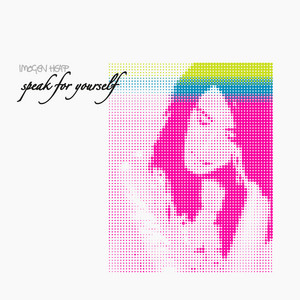I learned about Imogen Heap, like many did, via the use of her song “Hide and Seek” in The Lonely Island’s 2007 SNL digital short “Dear Sister.” The short was a parody of the season two finale of the hit teen drama “The O.C.,” which heavily features the same song. The iconic “mmm watcha say” portion of the track has helped retain the song’s place in pop culture, maybe most famously, by being sampled in Jason Derulo’s 2009 number-one hit “Watcha Say.” The Jason Derulo track would later be used in another hit show, “Gossip Girl.” With the original song’s sole use of a digital harmonizer/vocoder and lyrics full of metaphors and vivid imagery, I fell in love with “Hide and Seek” from the moment I heard it on “Dear Sister.” Still, it would be a while before I truly fell in love with Imogen Heap as an artist.
In May of 2022, I watched Zack Braff’s 2004 directorial debut “Garden State” on my Chromebook in the back of my sophomore chemistry class. “Garden State” includes a Grammy-winning soundtrack consisting of songs from The Shins, Nick Drake, Iron & Wine and Coldplay (back when they were still good), but it would be the final song of the film that would truly leave an impact on me. The final song of the film was one entitled “Let Go” by a group called Frou Frou. Upon the first words sung in the song: “Drink up, baby, down / Mmm, are you in or are you out?” I knew I recognized the voice. After looking up the soundtrack on Spotify and looking into Frou Frou’s profile, I came to find out, just like the X music community one fateful day in April of 2024, that Frou Frou was in fact Imogen Heap.
After working on a track for her 1998 debut album, “iMegaphone,” an album so unsuccessful that it resulted in Heap being dropped by her then-label, acclaimed music producer Guy Sigsworth invited Imogen Heap to collaborate with him on a duo project, Frou Frou. In 2002, they released their debut album, “Details.” “Details” would again go on to be another flop for Imogen, and the pair ultimately split up two years later. However, Zack Braff’s use of “Let Go” would shine a spotlight on Frou Frou, garnering them a cult-following. Unfortunately, Frou Frou was officially over, but Imogen Heap was about to take her solo career much more seriously. On July 18, 2005, Imogen Heap released her second, first-entirely self-produced, studio album “Speak for Yourself,” and this past Friday she released the 20th Anniversary Remaster.
“Speak for Yourself” is an album that is both ahead of its time in terms of sound and production, and firm in its time and place. The album’s computer beats and jangly synths serve as the perfect soundtrack for early 2000s pop music, but the songs still have stood the test of time. This album alone has inspired many of the biggest artists today in various ways. “Hide and Seek” popularized the use of the vocoder, which has been twisted in new ways over the years by artists like Kanye West and Bon Iver. Ariana Grande’s 2018 album “Sweetener” includes a reimagining of “Speak for Yourself’s” second single “Goodnight and Go.” In an interview with Entertainment Weekly in January of this year, Grande stated that Imogen Heap is her “idol” and her “number-one favorite musician, songwriter and producer.” This love seems to stem back to Grande’s beginning days as an artist with a YouTube video uploaded to her channel back in 2013 of her covering “Speak for Yourself’s” “Just for Now.”
Ariana Grande is not the only mainstream pop artist to be inspired by Imogen Heap. In 2014, Taylor Swift had Imogen Heap write the closing track for her album “1989,” “Clean.” The production of the song is evidently Imogen Heap’s style and shares many of the same elements as the back-to-back “Speak For Yourself” tracks “Just for Now” and “I Am in Love with You.” Swift would mention to the Recording Academy how cool it was to watch Imogen Heap do nearly everything on her own, with no assistants or engineers to help. She would have Heap return for the “Taylor’s Version” of “Clean” in 2023.
“Just for Now” has had more life due to its prominent sampling on multiple Lil B songs, most notably “B.OR. (Birth of Rap)” and “I’m God,” off his 2009 mixtape “6 Kiss.” Lil B became a pioneer for the rise of the cloud rap genre, and “I’m God” would get even further traction after the song’s producer, Clams Casino, released a solo instrumental version in 2020. Fellow cloud rap pioneer, A$AP Rocky, used the “Speak for Yourself” opening track, “Headlock,” on his 2013 track “Angels.” The constant use of Imogen Heap’s music in rap is all thanks to Heap “liberally [granting] permission for other artists to interpret and recontextualize her work.” She stated in an interview with PAPER Magazine in 2019 that she loves when “people collaborate with [her] music,” seeing artists breathe new life into her creations. In more recent years, Imogen Heap has granted more and more upcoming artists the opportunity to sample her work, giving them the chance to gain more experience in music production. It seems that every day I see a new release on Imogen Heap’s Spotify page, just to find it to be another credit from an artist sampling one of her songs.
Similar to her previous work, “Speak for Yourself” was not an immediate hit upon its release. However, back in July of this year, “Headlock” was certified platinum by the RIAA. Over the past couple of years, “Headlock” has had a massive resurgence via TikTok, with nearly 170 thousand videos posted to the song. With a whole new generation of listeners, it’s no surprise to see a new wave of artists trying to replicate the sound of early 2000s electronic-pop music. Think artists like Charli XCX or After, a band currently on the rise. “Headlock” has never been one of my favorite Imogen Heap tracks; I’ve always found it to be a little slight compared to the rest of the album, but I’m immensely glad to see that it has introduced so many people to her ageless sound.
The 20th anniversary remaster of “Speak for Yourself” was released this past Friday and was marketed as how the album would’ve sounded when Heap was creating it in the studio. If this is true, magic must’ve been cooking in that studio because the production is so crisp and lush that I can almost see the sparkles twinkling from off my headphones. “Speak for Yourself” has been sampled to high heaven and memed beyond belief, but 20 years on, it has never lost a pinch of its identity. In the time since “Speak for Yourself’s” release, Imogen Heap has only expanded her musical talents and invented some truly cutting-edge technology. She is truly an icon in every sense of the word.









